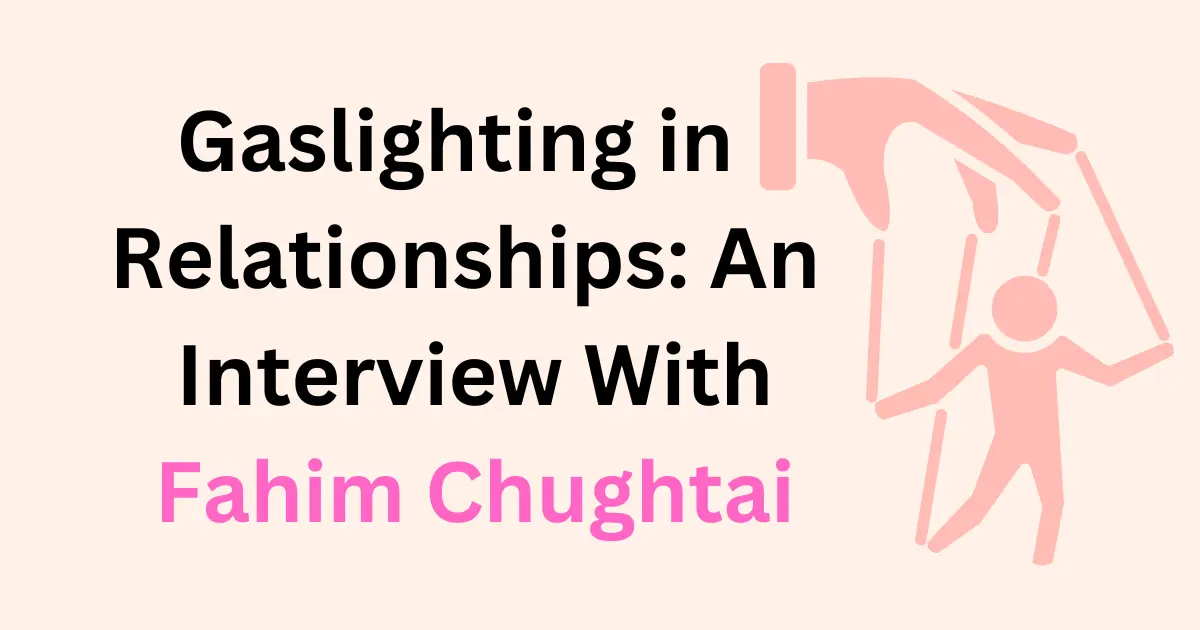Welcome, everybody! Today, we are looking into a matter that is getting more and more attention in discussions about toxic relationships—gaslighting. The mental health of a person can be seriously damaged, to the point of losing their self-confidence and even being disillusioned by reality as a result of this form of psychological manipulation.
Famous psychologist and narcissism expert, Fahim Chughtai, are with us to explain the pitfalls of gaslighting and offer us guidelines on how to detect and come out of controlling cycles. Over the years, Fahim has been assisting those who are in the throes of a relationship break. He is a forceful supporter for the people who are on their journey towards healing and have found their way back to themselves. We would like to welcome you to our program today, Mr. Fahim.
Key Takeaways on Gaslighting in Relationships from the Fahim Chughtai’s Interview

- Definition of Gaslighting: Gaslighting is an emotional abuse tactic where one person manipulates another to doubt their thoughts, memories, and perceptions. In this case, the victim hence questions, through the abuser’s psychological hold on them, his reality and has to depend on his abuser to think of self.
- Signs of Gaslighting.Constant Self-Doubt: Victims consistently doubt their own perceptions and memories. Some of the warning signs include feeling confused and nervous after interacting with the gaslighter as well as thinking that the gaslighter tries to ignore or diminish the victim’s feelings, which in turn makes them feel that they are being unreasonable or too sensitive.
- Constant Self-Doubt: Victims usually question their own perceptions and memories.
- Confusion and Anxiety: The person spoke of feeling off-balance after the gaslighter intervened with his thought process.
- Invalidation: The household interferes with the victim’s trust of evidence. The members of the household, particularly the perpetrating member, downplay the feelings or refuse to listen to the victim, leading the victim to believe that it is them who is too strict or intolerant if they bring the subject up again.
- Intentional vs. Unintentional Gaslighting:Intentional: Gaslighting that is usually visible in cases of narcissistic relationships, or relationships with toxic individuals where the main point is control and power, as a matter of fact, the use of gaslighting is meant. Unintentional: This could be through someone giving the blame to another party or due to conflict avoidance whereby one is not aware that the other person is being emotionally hurt.
- Intentional: Gaslighting is common in relationships with narcissistic people or individuals who have toxic behaviors that are exercised deliberately in order to gain control and power.
- Protection: It results from the refusal of a person to take responsibility or unpreparedness to face challenges without direct confrontation, thus missing the gravity of the emotional hurt they can inflict.
- Protective Measures:Documenting Experiences: Keep a record to document the events and conversations and thus, in turn, based in reality.Sharing the Experience with Others: The feedback of trusted persons, who may be friends, family, or therapists, is essential in the process of discussing your experiences. Objective perspective is also sought through this discussion.Setting Boundaries: Shield your peace of mind by politely setting your own view point and avoiding to fall victims of manipulation.
- Documenting Experiences: Keep a record to document the events and conversations and thus, in turn, base in reality.
- Seeking External Validation: Explain your problems to close friends, family members or a therapist, and ask them to provide you with their own, objective view about your situation.
- Setting Boundaries: Be in charge of your mental health by calmly stating your standpoint and do not involve yourself in the manipulative tactics.
- Escaping Trapped Situations:Create a Safety Plan: Progress by degrees to divorce yourself from situations gradually by first accumulating some money or legal advice. Organizations specializing in such aid can also be an alternative.Emotional and Financial Independence: Even taking the smallest steps towards medicating past financial instability and establishing the right social network can is the breakthrough needed in the journey.
- Create a Safety Plan: Gradually take steps toward becoming independent, such as saving money, getting legal aid, and connecting with support organizations.
- Emotional and Financial Independence: Just even the smallest measures in the direction of time to time solidarity and support making will eventually make the difference in the successful liberation.
- Final Advice:Trust Your Feelings: Your emotions & perceptions are real. If something feels wrong, recognize it and get the help you need.
- Seek Healing: Recovery does not imply only walking away from the bad relationship but also building your self-esteem and a sense of self. Stay surrounding with helpful people and leave it one day at a time.
Fahim Chughtai:
You know, it’s my pleasure! I’m really happy to be here and talk about this. Gaslighting is one of the most sly forms of manipulation, and I personally think that it’s very necessary to let people know about it so they can get it even at a very early stage and shield themselves.
Sarah Thompson
Gaslighting is a term that has recently come into substantial use, especially in the context of relationships. However, those who do not know what it is, for example, the new ones in a relationship, would you please give them a simple explanation of gaslighting?
Fahim Chughtai:
For sure! Gaslighting is a type of emotional maltreatment in which one person influences the other to doubt their thoughts, memories, and how they view things. The gaslighter typically does this by distorting reality to baffle the victim, so as they ask themselves if they really are losing their mind. This is accomplished by voiding the truth, disagreeing, or belittling the victim’s feelings. With time, the victim starts to believe the gaslighter’s view and therefore they become even more skeptical about their intellectual abilities.

A great case I have come across in therapy is when one partner accuses another of always being forgetful. For example, a woman — we can name her Anna — would ask her husband if he could pick up their child from the daycare after work. He’d agree, but, later on, he’d deny it when she brought it up, saying that there was no such discussion. He would express a statement to the effect of “You never told me to do that. You should still be making things up.”
Anna would have been so worried after witnessing this so many times that she would say to herself maybe she was indeed forgetful or even she was becoming mad. Well, when solution dare yet another breakthrough comes-The victim becomes so dependent on the gaslighter for their sense of reality they actually become willing to trust the gaslighter over their sanity.
Sarah Thompson
This is such a compelling case. You can see how sneaky and cunning gaslighting is. “Abuse” is often thought to be something straightforward, but gaslighting is certainly more psychological and covert. How is a person supposed to start to see the signs of gaslighting as it might be so initially subtle?
Fahim Chughtai:
You’re quite right-gaslighting is really much more covert and psychological than other forms of abuse, and it is this that makes it so harmful. You may recognize it by considering how you feel in the relationship. In the beginning, one of the first things you may sense is that something is not right is when you find yourself doubting the reality of your own experiences. If you constantly find yourself thinking, “Is that for real?” or “Maybe I’m just too sensitive,” that’s a really important sign.
When a person is manipulated, they find themselves struggling with a myriad of emotions such as so much confusion and anxiety. James, a client of mine, is an excellent example of that. He told me that in every conflict he had with his girlfriend, he was totally in the dark at the end. When he came home, he would be holding one set of facts and feelings in his possession, yet when the quarrel was over, she had spun the story in such a way that he could not even tell what the fight was about anymore.
He would also say things likes, “You’re remembering it all wrong,” or, “I never said that,” when he knew she had. This kind of disorientation is the most common way gaslighters deploy.
Gaslighters might also try convincing you that what you are feeling is not valid—i.e. that you are being too emotional or drawing wrong conclusions. If your partner contorts the story every time you introduce a problem and makes it look like you are the one at fault each time, then that is another sign.
Sarah Thompson
It looks like gaslighting can be really harmful because it can make a person feel less confident over a period of time. Why do people engage in gaslighting in the first place? Is it always intentional, or can it happen unintentionally as well?
Fahim Chughtai:
It depends on the situation, and the answer is not cut and dried. In some situations, gaslighting is wholly deliberate. It is usually the case in toxic relationships with narcissists or persons with other disruptive personality disorders.
For them, gaslighting is an avenue for them to dominate and to be in control. By glaringly making the victim question their own judgment, they eventually create a relationship where they are the ones who control the conversation, and their lover becomes entirely dependent on them.
The story of Tom comes to mind when dealing with gaslighting. Tom, the man who was married to a narcissist. He would always be contradicted by his wife no matter what he talked about, and when he mentioned her insincerity, she would use phrases like, “I don’t know what you’re talking about”, or, “You’re making that up” to throw off his statements.
Tom found himself saying he’s sorry just to keep the peace, which in turn let his wife gain more authority. This was a very intentional approach she adopted to throw him off balance and assert control over him in the relationship.
Nevertheless, gaslighting may be as well unintentional. Individuals gaslight others because they usually never realize the way to handle a conflict or take responsibility for oneself. For instance, in counseling, there was a person I worked with called Eric who would be unconsciously gaslight my wife.
When she spoke about something he did wrong, he either outright denied or explained, “Maybe you again misunderstood me.” He was not doing that because he was manipulating her, but because he was so reluctant to admit to using subterfudge and denial his ready-made option. He deeply perceived that he could deny the fault and that not admitting the fault was equivocal to not committing it.
In any case, the victim’s experience is similar—constantly doubting oneself, feeling confused and distressed. Even simply because gaslighting is not done with the intent, it still causes a notable emotional trauma.
Sarah Thompson
That is logical. Regardless of the reason, the outcome would be that the victim is dazed and feels unfit to assert himself/herself. For a reader who might be listening and saying, “These are the characteristics of my relationship,” what measures can they take to protect themselves from more gaslighting?
Fahim Chughtai:
One of the things that matter most and want to be achieved by trust is to follow your intuition or feeling. If you have a gut-feeling that something is wrong then most probably it really is and you should act upon it. Keep writing about the things–every word you say to your partner and the dates and times this happens.
Reflect back on the times you were treated as though you were being unreasonable or you gave credibility grades to other people when you knew very well the gaslighter was the one distorting the truth. It is this that helps to bring you down to earth with evidence of straight facts when the narcissist attempts to sway you away.
The next is to find affirmation from something other than your own self. Talk to someone you know and respect—your family, friends, a trained professional, or whoever is readily available about your situation. A key function of such an individual is to offer an unbiased interpretation of the problems of your close relationship with your partner. This can be more influential than any of the false stories the gaslighter tells.
For Example, I worked with Claire, a lady who was caught up in a situation where her lover would all the time use gaslighting on her. He would blame her for things that she hadn’t actually done and then, after she said it, he would deny it later. She would make a point to record the dates and facts exactly in her journal after their conversations and go back to them after any disagreement to ensure she was grounded.
She went to the friends who were close to her and she confirmed her experience, and this built her connection with reality again. It’s a tough situation not to have to deal with if you can get your way. The important thing is not to allow yourself to be maneuvered by other people. You should calmly state your situation instead of getting drawn into their fruitless argument by saying, “I’m certain that is not how it went,” and then ending the conversation.
Sarah Thompson
However, what is the suggestion for someone who is totally bounded in a gaslighting connection, either emotionally or financially. How to help them?
Fahim Chughtai
Being trapped is one of the most common situations where gaslighting is prevalent and especially when it’s combined with money or inseparable emotional bonds. The first thing I want people to know is that they are not alone and there are many support systems in place.
One of the best ways to liberate yourself is to have a safety plan ahead. It can be a series of actions that you can take that may only include some simple moves towards self-reliance, such as looking for support organizations, setting up a separate account and saving money there, or speaking to a lawyer or rather a counselor about your options.
I still recall a situation with the woman Rachel once; she had endured gaslighting from her husband for a long time. He was the one in charge of money, and she didn’t have her own financial source. Rachel was so despondent because leaving town seemed a very difficult task due to her being money less.
In time, though, she found out that she was able to do some freelance work on the side, saved some of the money, and, together with a therapist and a lawyer, she devised a plan. It was a slow process, but she finally developed enough financial capability to leave the relationship.
There’s never a smooth path for anyone going to freedom, but every step you take, even the smallest, will bring you closer to it. Also, remember that emotional support counts as much. Don’t drift away. Talk to friends, family, or a professional person who is likely to help you get the best way out of the situation.
Sarah Thompson
That’s Inspirative and emotional story of Rachel. The sad part of the story, however, it’s shining the light of hopes, it’s just one of the many scripts of hope. The question is how to use it. What do you want our readers to carry away with them from this?
Fahim Chughtai:
You should always keep in mind that your emotions and opinions are true. Gaslighting operates by sanctioning you to doubt your judgments; yet, you possess the legal authority to guard your inner voice and intuition. When you feel that something is not right, do not let that internal treasure misguide you. Begin by recovering your reality, look for help, and realize that it’s likely to be released.
RehumanizeRecovering from gaslighting is not only about leaving the stinky relationship, but also repairing your self-esteem and self-identity. Always be in positive environments that nurture your self and help you to remember that you have a value. Just take one step at a time and discover that you are more powerful than you think. The issue is always there, and you are eligible to live your life in a free and fair way.
Last Words
Thanks a lot, Fahim, for being so nice and open to your insights and experiences with us. What you know about working your way through the gaslighting challenges has been a major breakthrough in a subject that is not entirely understandable by many. To anyone undergoing abusive relationships, it is essential to remember that there are many resources one can access and that nobody can take away the reality and emotions of a person.
We trust that this type of conversation offers a bit of hope and light to those who are gaslighted, and through it, they will be motivated to seek out their voice and independence. The power to break free lies within you, and with the right guidance, you will cut through the web of trickery.








Great insights! It’s shocking how common gaslighting is. Thanks for sharing this valuable information.
welcome